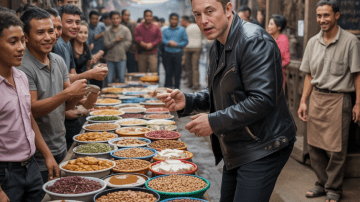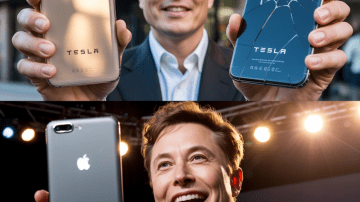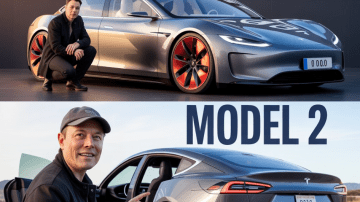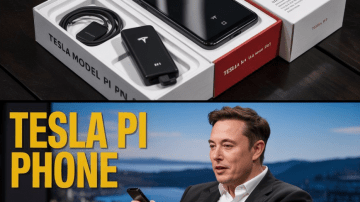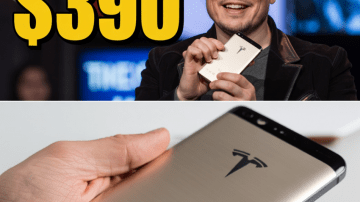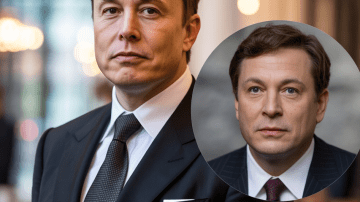In the annals of business history, few moments rival the seismic shift that unfolded on a crisp September morning in 2025. Elon Musk, the enigmatic visionary who propelled Tesla from a fledgling startup to a trillion-dollar juggernaut, announced his resignation as CEO – not for a cushy boardroom perch or a pivot to another tech empire, but to trade the boardroom for the barnyard. At 54, the world’s richest man, worth an estimated $415 billion, declared he was stepping down to become a full-time farmer, driven by a deeply personal promise to his youngest daughter. The news, dropped via a poignant X post that racked up 50 million views in hours, left the world reeling: Was this the end of an era, or the dawn of something profoundly human?

Picture the scene: A sprawling Texas ranch at dawn, golden light filtering through pecan trees as Musk, clad in a faded flannel shirt and mud-caked boots, cradles a tiny lamb in his arms. This wasn’t a staged photo op; it was the backdrop for his bombshell announcement. “After 20 years of pushing humanity toward the stars and sustainable energy, it’s time to ground myself,” Musk wrote. “My daughter, little Exa, asked me last week why I never have time to plant seeds with her. Today, I plant them – literally. Stepping down as Tesla CEO effective immediately to focus on family and the soil that feeds us all.” The post included a snapshot of a giggling toddler – Exa Dark Sideræl Musk, his 3-year-old daughter with musician Grimes – knee-deep in a vegetable patch, her tiny hands clutching a carrot. It was raw, vulnerable, and utterly un-Musk-like.
The reaction was instantaneous and electric. Tesla’s stock plummeted 12% in pre-market trading, wiping out $80 billion in market value before the opening bell. Social media erupted in a frenzy of memes, tributes, and conspiracy theories. “Elon farming? Next he’ll say the Cybertruck is for hauling hay bales,” quipped one viral tweet. Investors like Ross Gerber, who had long called for Musk to step aside amid Tesla’s recent stumbles, hailed it as “the reset Tesla desperately needed.” But for fans, it felt like losing a superhero. “He’s not just a CEO; he’s the spark that lit the EV revolution,” lamented a Tesla owner in Austin, tears streaming as he charged his Model Y one last time under Musk’s watch.
To understand this pivot, we must rewind to Musk’s whirlwind life – a tapestry of triumphs, turmoil, and tireless ambition. Born in 1971 in Pretoria, South Africa, Elon Reeve Musk was always a dreamer outpacing his era. At 12, he coded and sold his first video game, Blastar. By 28, he’d co-founded X.com, which morphed into PayPal and netted him $180 million after eBay’s acquisition. He poured that fortune into SpaceX in 2002, vowing to colonize Mars, and Tesla in 2004, betting on electric cars when the world scoffed at battery-powered dreams.
Tesla’s ascent under Musk was nothing short of legendary. What began as a niche Roadster in 2008 evolved into the mass-market Model S in 2012, the SUV sensation Model Y by 2020, and the affordable Model 3 that flooded roads worldwide. Musk’s unorthodox style – sleeping on the factory floor during production hell, tweeting bold predictions that moved markets, and defying skeptics with gigafactories sprouting like futuristic fortresses – turned Tesla into a cultural icon. By 2025, Tesla commanded 25% of the global EV market, with over 2 million vehicles delivered annually. Innovations like Full Self-Driving software and the Optimus robot promised a future where cars drove themselves and homes ran on solar-powered autonomy.

Yet, glory came at a cost. Musk’s empire expanded voraciously: Neuralink for brain-machine interfaces, The Boring Company for underground tunnels, xAI for artificial general intelligence, and even a foray into government as co-head of the Department of Government Efficiency (DOGE) under President Trump, where he slashed federal bureaucracy with meme-worthy flair. But cracks appeared. Tesla’s stock, once soaring past $400 a share, dipped below $200 amid slowing sales in Europe and China, fierce competition from BYD and Rivian, and regulatory scrutiny over Autopilot crashes. Whispers of Musk’s divided attention grew louder. “He’s spread thinner than a SpaceX Starship heat shield,” joked a Silicon Valley analyst.
Enter the human element: Musk’s family. Father to 14 children with four women, his personal life has been as chaotic as his professional one. There’s Nevada, lost tragically to SIDS at 10 weeks in 2002; twins Vivian and Griffin; triplets Kai, Saxon, and Damian; and the headline-grabbers like X Æ A-Xii (now 5, already tinkering with code), Exa Dark Sideræl (born via surrogate in 2021), and the latest, twins Strider and Azure with Neuralink executive Shivon Zilis. Grimes, his on-again-off-again partner, has spoken candidly about the toll of his 100-hour weeks: “Elon’s brain is a galaxy, but sometimes I wish he’d just stargaze with us.”
The catalyst for this farm-bound leap? Exa. At a rare family barbecue in August 2025, the wide-eyed girl tugged at Musk’s sleeve amid the sizzle of vegan burgers. “Daddy, why do you build rockets but never grow flowers? Mommy says farms make people happy.” Grimes later shared in a tearful Instagram Live that Exa, battling a mild developmental delay from her premature birth, had taken to “farm therapy” – sessions where she planted seeds to build fine motor skills and emotional resilience. “She lights up like a supernova when dirt’s involved,” Grimes said. Musk, ever the problem-solver, dove in. He bought a 500-acre plot near Giga Texas, dubbing it “Mars Soil Ranch” – a nod to his red planet dreams, now rooted in earthly loam.

What does farming look like for a man who’s launched reusable rockets? Far from a retirement hobby, it’s a deliberate reinvention. Musk’s vision: A regenerative farm blending high-tech and homesteading. Solar panels power irrigation systems drawing from Tesla batteries; AI drones monitor crop health, optimizing yields with xAI algorithms. He’s planting heirloom tomatoes, heritage wheat, and experimental carbon-sequestering cover crops – all while experimenting with vertical farming pods that could scale to feed Martian colonies. “Farming is the ultimate sustainability hack,” Musk tweeted post-announcement. “It turns CO2 into calories. If we crack this on Earth, Mars is a done deal.”
But the real magic? Father-daughter bonding. Mornings now start with Exa leading “seed parades,” scattering wildflower mixes that bloom in electric hues. Afternoons involve tractor rides – a souped-up Cyberquad pulling a trailer of giggling siblings. Evenings? Storytime under the stars, where Musk weaves tales of Zip2’s garage origins with lessons on soil microbes. “This isn’t escape; it’s recalibration,” he told a small gathering of ranch hands, many former Tesla engineers lured by the promise of “dirt under the nails and stars overhead.” Grimes, beaming from afar, added: “Elon’s always chased infinity. Now, he’s finding it in finitude – one furrow at a time.”
Tesla, meanwhile, braces for the unknown. The board, in a swift move, named Tom Zhu – the steely Chinese executive who scaled Giga Shanghai into a production behemoth – as interim CEO. Zhu, 43, is a no-nonsense operator with a track record of hitting delivery targets amid supply chain chaos. “Elon’s legacy is the rocket fuel; I’ll steer the ship,” he vowed in his debut address, streamed to 10,000 employees. Whispers suggest a permanent successor could be drawn from within: Perhaps JB Straubel, Tesla’s battery whisperer turned Redwood Materials founder, or even a wildcard like Apple’s Tim Cook for a tech infusion.
Investors are cautiously optimistic. Gerber, whose firm holds 262,000 shares, called the transition “bittersweet but necessary.” “Elon’s genius birthed Tesla, but his distractions nearly derailed it. This frees him to innovate elsewhere – and us to stabilize.” Analysts predict a 15% stock rebound by year’s end, fueled by the Robotaxi unveil in October and Cybercab production ramp-up. Yet, the void is palpable. “Who else tweets ‘Full Self-Driving just nailed a U-turn in a cornfield’?” pondered one trader.
Beyond the balance sheets, Musk’s move ripples through culture and conscience. In an age of burnout billionaires, he’s modeling radical priority: Family over fortune, earth over empire. Environmentalists applaud the farm’s potential – regenerative agriculture could sequester 1 gigaton of CO2 annually if scaled, per early models. Space enthusiasts see synergy: Ranch experiments in hydroponics and bio-domes directly feed Starship’s greenhouses. And for parents everywhere, it’s a gut-punch reminder: Even titans trade thrones for tiny hands.

As dusk falls on Mars Soil Ranch, Musk hoists Exa onto his shoulders, surveying rows of emerald shoots pushing through the clay. “See that, kiddo? That’s us – resilient, reaching for light.” She giggles, pointing to a firefly. “More stars, Daddy!” He smiles, the weight of worlds lifting. In this quiet corner of Texas, the man who dreamed of electric dreams and interstellar leaps finds his truest orbit: Home.
This isn’t goodbye to Elon Musk the mogul; it’s hello to Elon Musk the steward. Tesla endures, SpaceX soars, and now, a farm blooms – all because one little girl asked her dad to dig in the dirt. In a world racing toward tomorrow, perhaps the boldest step is pausing to plant today. What’s next for the farmer-king? Only the soil knows – and it’s whispering promises of abundance.

